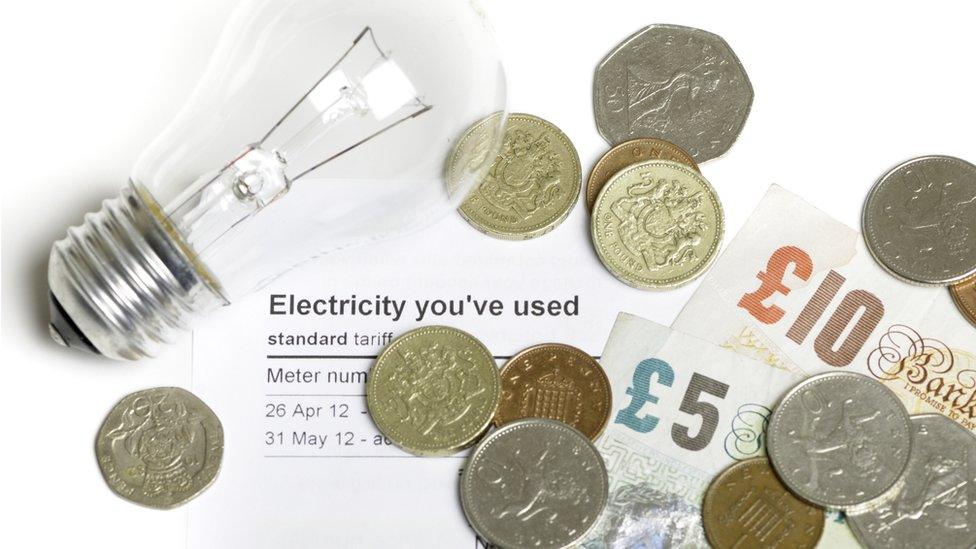How to save money working from home this winter
- Published

Laura Ann Moore gets people out of a financial mess
The heating is on and it's 11am on a weekday.
The slow cooker is making lunch and the laptop is uploading some audio for our radio programme. In the background This Morning is on TV silently (research and comparison purposes obviously).
This is my house - but a common and definitely energy-sapping picture in the middle of winter.
The last year has seen millions of us start to work from home.
And whether that suits you down to the ground, or you're suffering from cabin fever, we're all spending more on gas, electricity and supplies.
The average energy bill last year was £1,254, according to the regulator Ofgem - that's almost £3.50 a day.
The thing is, that's based on our old habits; commuting, a two-day weekend at home, so a few hours of heating here and there.
Some energy experts reckon home working could easily double those numbers this year.
So here are some ways you can save money, with the help of Laura Ann Moore - a money and mindset coach.
Claim up to £6 a week back
There are two ways of doing this.
Your employer can pay you it as an extra tax-free amount, if you work from home as they have an agreement with the government.
But not all employers offer it, especially if they are struggling.
"People think it's only six pounds [a week] but it adds up," says Laura.
The second and simplest way to claim back cash though is through your tax - by paying less of it.
To make things easy you can now sign up directly here, external.
This way might not be as generous, but means you don't pay tax on an extra £6 a week of what you earn.
This is a saving of £62.40 a year for basic rate taxpayers and £124.80 for higher rate taxpayers.
You don't need receipts.

The UNSUBSCRIBE button
Now we are all spending time in one place a budget can become a game-changer even if it's just to match what goes in with what comes out.
"One of the things I've been telling people to do is unsubscribe from marketing emails," Laura says.
She has multiple clients she's worked with since March who have let "boredom spending" become problematic.
"It's the instant gratification. If you feel like you can't trust yourself, take your credit card details off your phone."
Auto switch your utilities... all the time
The concept here is that your gas and electricity switches to a new supplier when a better deal pops up - without you doing anything.
The auto-switch market has just gained a big new player - Martin Lewis - and this could mean more competition, but we could also see more deals with early release fees.
They are normally only about £30 per fuel and it may mean a switch is not worth it.
But if you are at home all the time and like it hot, auto-switching may be the route for you - if you can cope with the loss of control.
It's not the only way you can save money when you auto-switch energy, according to Laura Ann Moore.
"You can get cashback - stuff that can stay in the bills pot [when you switch]."
She points out that we will all be using more water too, now many people have meters charging for how much we use.

Bills for heating could double with working from home
Let there be light - for longer
It might be worth looking at the bigger picture.
As it looks like we are all in this for the long run, you could change the lights bulbs - all of them - to LEDs.
They use 90% less energy than traditional bulbs and can sometimes pay for themselves through energy savings in just a couple of months, external.
It might cost a fair whack to change twenty bulbs in one go, but by April when you still have the lights on during a wet dull day, you'll be laughing.
Create the emergency fund
For many of us, going out of the house less frequently, whether to work or out for a drink, means saving smaller amounts - and these can add up.
"Actively make a decision to save this money," says Laura.
She points out with unemployment rising we all need to be saving more if we can - and home working savings are the best way to form that kick-start.
It's a big total, but three months wages is often talked about as a good figure.
Laura says: "That's what most people are realising now, that they don't have an emergency fund."


Follow Newsbeat on Instagram, external, Facebook, external, Twitter, external and YouTube, external.
Listen to Newsbeat live at 12:45 and 17:45 weekdays - or listen back here.
- Published9 October 2020

- Published8 October 2020

